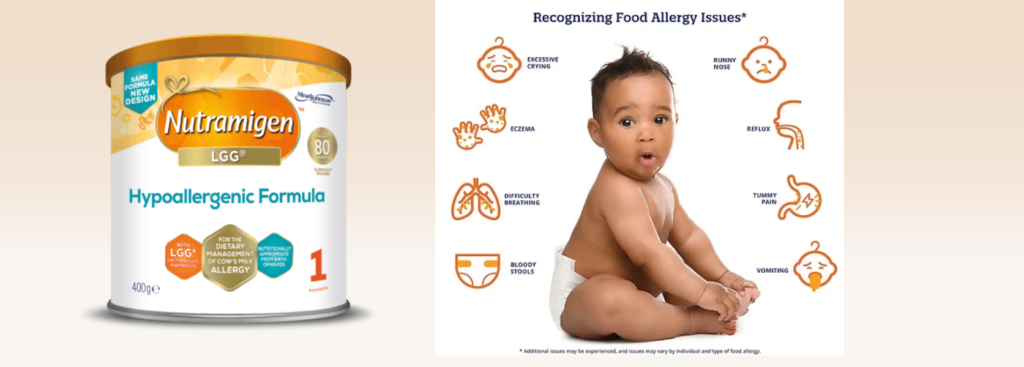What are the signs that someone might experience while using the Nutramigen formula?
Symptoms of Nutramigen formula
Nutramigen is a specialized formula designed for infants with cow’s milk protein allergy or other severe food allergies. Symptoms associated with these allergies might include:
- Digestive Issues: These can range from mild to severe and may include symptoms like diarrhea, vomiting, constipation, or excessive gas.
- Skin Reactions: Allergic reactions might manifest on the skin as rashes, eczema, or hives.
- Respiratory Problems: In some cases, infants might experience wheezing, coughing, or nasal congestion due to an allergic reaction.
- Crying and Irritability: Uncomfortable symptoms might make the baby fussier or more irritable than usual.
- Failure to Thrive: Severe allergies can impact a baby’s ability to gain weight or grow properly.
How can I tell if my infant has an allergy to formula?
If you suspect your baby might be allergic or intolerant to cows’ milk, it’s crucial to consult your GP or health visitor about your concerns.
Seeking medical advice is important to evaluate if your baby’s symptoms could be due to a cows’ milk allergy or another issue. It’s advisable to consult a healthcare professional before removing cows’ milk from your child’s diet, as it contains essential nutrients.
Cows’ milk allergy (CMA), also known as cows’ milk protein allergy, is a common childhood food allergy affecting about 7% of infants under 1 year, but most kids tend to outgrow it.
CMA typically emerges when babies start consuming cows’ milk either in formula or as they begin solid foods. In rare cases, exclusively breastfed babies might also be affected as they can get cows’ milk proteins through breast milk.
CMA presents in two main forms:
- Immediate CMA: Symptoms typically appear shortly after consuming cows’ milk.
- Delayed CMA: Symptoms may arise hours or even days after cows’ milk intake.
Symptoms of cows’ milk allergy encompass a wide range, such as:
- Skin reactions like rashes or facial swelling
- Digestive issues such as stomach ache, vomiting, or diarrhea
- Hay fever-like symptoms such as a runny or blocked nose
- Persistent eczema that doesn’t improve with treatment
Severe allergic reactions can occur suddenly, leading to swelling in the mouth or throat, wheezing, coughing, breathing difficulties, and in extreme cases, anaphylaxis, which is a medical emergency requiring immediate attention.
Treatment for CMA involves eliminating all cows’ milk from your child’s diet, which may include special infant formula if your baby is formula-fed or the mother avoiding all cows’ milk products if breastfeeding exclusively. Consulting a healthcare professional is crucial before making any dietary changes.
Children with CMA should be periodically assessed to track if they’ve outgrown the allergy.
Lactose intolerance, on the other hand, involves the body’s inability to digest lactose, a natural sugar in milk, but it’s not an allergy. Symptoms include diarrhea, vomiting, stomach pains, and wind.
Treatment for lactose intolerance varies based on the severity, and some children might tolerate small amounts of dairy without symptoms.
Seeking guidance from a healthcare professional or a dietitian is recommended for managing lactose intolerance in children.
Remember, it’s essential to consult with a healthcare professional for accurate diagnosis and guidance tailored to your child’s specific condition.
Is it possible for babies to have an allergy to Nutramigen?
Various Types of Hypoallergenic Formulas Lately, I’ve been getting many inquiries about the different kinds of hypoallergenic formulas available. Often, infants with milk protein allergies might test multiple formulas before finding one that suits them.
Here’s an overview of these formulas:
Hydrolysate (Extensively Hydrolyzed) Formula: Examples of hydrolysate formulas include Nutramigen and Alimentum. While these formulas are hypoallergenic, their proteins aren’t entirely broken down, leaving a possibility of allergic reactions.
Amino Acid-Based Formula: This formula, known as ‘super’ hypoallergenic, is made from individual non-allergenic amino acids, making it easily digestible and absorbable. Neocate falls under this category, and its powdered products are produced in a dairy protein-free environment.
At times, babies exhibiting signs of a cow milk allergy may start with a hydrolysate formula. If symptoms persist after a few weeks, doctors may suggest shifting to an amino acid-based formula. However, this transition period can be tough for both the baby and parents.
Depending on the symptoms, healthcare professionals might recommend starting with an amino acid-based formula first, knowing it provides quick relief if the baby has a milk protein allergy.
If a baby responds positively to Neocate – typically resolving milk allergy signs within 3-14 days – parents might try transitioning to a hydrolyzed formula. If Neocate doesn’t improve symptoms, it indicates the issue might not be related to a milk protein allergy, prompting further investigation by the medical team.
For parents dealing with a recently diagnosed milk protein allergy, discussing the best approach with their doctor is crucial. If you suspect your baby has a milk protein allergy but lacks a diagnosis, scheduling an appointment with your doctor is recommended.
Have any questions? Feel free to ask in the comment!
